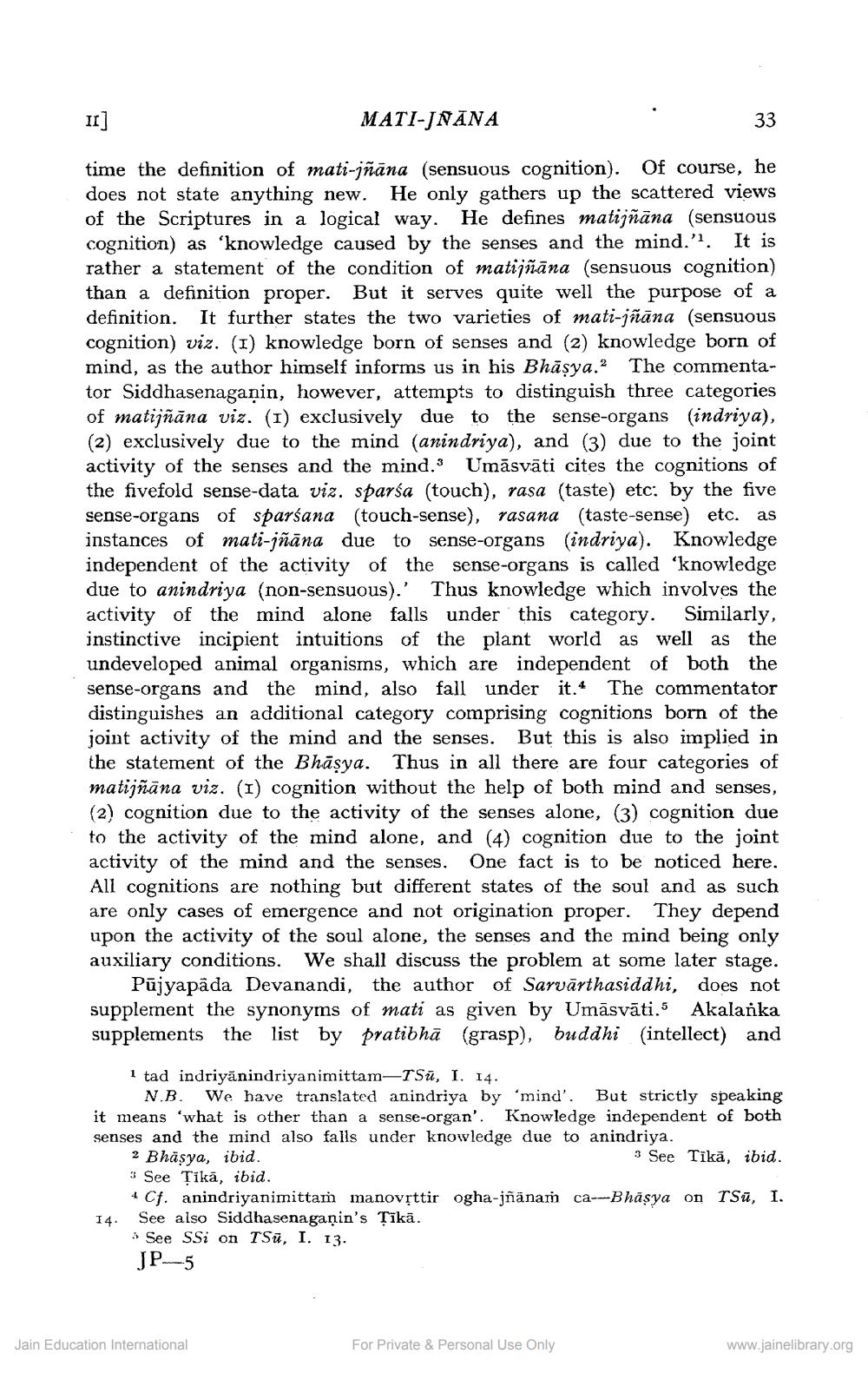________________
II]
time the definition of mati-jñāna (sensuous cognition). Of course, he does not state anything new. He only gathers up the scattered views of the Scriptures in a logical way. He defines matijñāna (sensuous cognition) as 'knowledge caused by the senses and the mind."1. It is rather a statement of the condition of matijñāna (sensuous cognition) than a definition proper. But it serves quite well the purpose of a definition. It further states the two varieties of mati-jñāna (sensuous cognition) viz. (1) knowledge born of senses and (2) knowledge born of mind, as the author himself informs us in his Bhāṣya.2 The commentator Siddhasenaganin, however, attempts to distinguish three categories of matijñāna viz. (1) exclusively due to the sense-organs (indriya), (2) exclusively due to the mind (anindriya), and (3) due to the joint activity of the senses and the mind." Umāsvāti cites the cognitions of the fivefold sense-data viz. sparsa (touch), rasa (taste) etc: by the five sense-organs of sparśana (touch-sense), rasana (taste-sense) etc. as instances of mati-jñāna due to sense-organs (indriya). Knowledge independent of the activity of the sense-organs is called 'knowledge due to anindriya (non-sensuous).' Thus knowledge which involves the activity of the mind alone falls under this category. Similarly, instinctive incipient intuitions of the plant world as well as the undeveloped animal organisms, which are independent of both the sense-organs and the mind, also fall under it.4 The commentator distinguishes an additional category comprising cognitions born of the joint activity of the mind and the senses. But this is also implied in the statement of the Bhāṣya. Thus in all there are four categories of matijñāna viz. (1) cognition without the help of both mind and senses, (2) cognition due to the activity of the senses alone, (3) cognition due to the activity of the mind alone, and (4) cognition due to the joint activity of the mind and the senses. One fact is to be noticed here. All cognitions are nothing but different states of the soul and as such are only cases of emergence and not origination proper. They depend upon the activity of the soul alone, the senses and the mind being only auxiliary conditions. We shall discuss the problem at some later stage.
MATI-JNĀNA
Pujyapada Devanandi, the author of Sarvärthasiddhi, does not supplement the synonyms of mati as given by Umasvāti.5 Akalanka supplements the list by pratibha (grasp), buddhi (intellect) and
14.
1 tad indriyanindriyanimittam-TSū, I. 14.
N.B. We have translated anindriya by 'mind'. But strictly speaking it means 'what is other than a sense-organ'. Knowledge independent of both senses and the mind also falls under knowledge due to anindriya.
2 Bhāṣya, ibid.
3 See Tikä, ibid.
33
Jain Education International
See Tikā, ibid.
4 Cf. anindriyanimittam manovṛttir ogha-jñānaṁ ca-Bhāṣya on TSū, I. See also Siddhasenaganin's Tīkā.
See SSi on TSu, I. 13.
JP-5
For Private & Personal Use Only
www.jainelibrary.org




